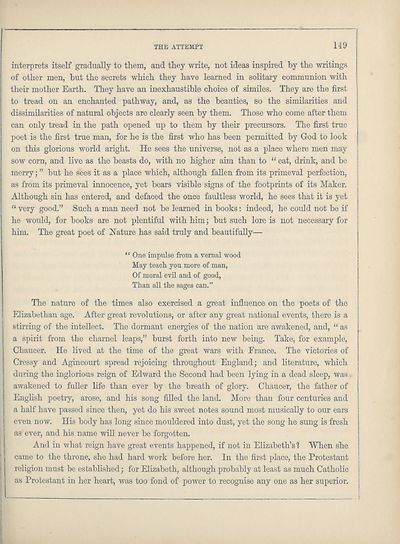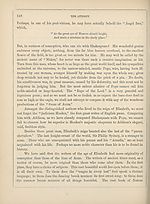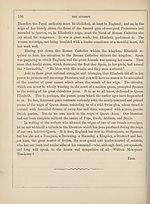Attempt > Volume 1 and Select writings
(161) Page 149
Download files
Complete book:
Individual page:
Thumbnail gallery: Grid view | List view

THK ATTEMPT
149
interprets itself gradually to them, and they write, not ideas inspired by the writings
of other men, but the secrets which they have learned in solitary communion with
their mother Earth. They have an inexhaustible choice of similes. They are the first
to tread on an enchanted pathway, and, as the beauties, so the similarities and
dissimilarities of natural objects are clearly seen by them. Those who come after them
can only tread in the path opened up to them by their precursors. The first true
poet is the first true man, for he is the first who has been permitted by God to look
on this glorious world aright. He sees the universe, not as a place where men may
sow corn, and live as the beasts do, with no higher aim than to “ eat, drink, and be
merry; ” but he sees it as a place which, although fallen from its primeval perfection,
as from its primeval innocence, yet bears visible signs of the footprints of its Maker.
Although sin has entered, and defaced the once faultless world, he sees that it is yet
“ very good.” Such a man need not be learned in books: indeed, he could not be if
he would, for books are not plentiful with him; but such lore is not necessary for
him. The great poet of jSTature has said truly and beautifully—
“ One impulse from a vernal wood
May teacli you more of man,
Of moral evil and of good,
Than all the sages can.”
The nature of the times also exercised a great influence on the poets of the
Elizabethan age. After great revolutions, or after any great national events, there is a
stirring of the intellect. The dormant energies of the nation are awakened, and, “ as
a spirit from the charnel leaps,” burst forth into new being. Take, for example,
Chaucer. He lived at the time of the great wars with Erance. The victories of
Cressy and Agincourt spread rejoicing throughout England; and literature, which
during the inglorious reign of Edward the Second had been lying in a dead sleep, was .
awakened to fuller life than ever by the breath of glory. Chaucer, the father of
English poetry, arose, and his song filled the land. More than four centuries and
a half have passed since then, yet do his sweet notes sound most musically to our ears
even now. His body has long since mouldered into dust, yet the song he sung is fresh
as ever, and his name will never be forgotten.
And in what reign have great events happened, if not in Elizabeth’s ? When she
came to the throne, she had hard work before her. In the first place, the Protestant
religion must be established; for Elizabeth, although probably at least as much Catholic
as Protestant in her heart, was too fond of power to recognise any one as her superior.
i
149
interprets itself gradually to them, and they write, not ideas inspired by the writings
of other men, but the secrets which they have learned in solitary communion with
their mother Earth. They have an inexhaustible choice of similes. They are the first
to tread on an enchanted pathway, and, as the beauties, so the similarities and
dissimilarities of natural objects are clearly seen by them. Those who come after them
can only tread in the path opened up to them by their precursors. The first true
poet is the first true man, for he is the first who has been permitted by God to look
on this glorious world aright. He sees the universe, not as a place where men may
sow corn, and live as the beasts do, with no higher aim than to “ eat, drink, and be
merry; ” but he sees it as a place which, although fallen from its primeval perfection,
as from its primeval innocence, yet bears visible signs of the footprints of its Maker.
Although sin has entered, and defaced the once faultless world, he sees that it is yet
“ very good.” Such a man need not be learned in books: indeed, he could not be if
he would, for books are not plentiful with him; but such lore is not necessary for
him. The great poet of jSTature has said truly and beautifully—
“ One impulse from a vernal wood
May teacli you more of man,
Of moral evil and of good,
Than all the sages can.”
The nature of the times also exercised a great influence on the poets of the
Elizabethan age. After great revolutions, or after any great national events, there is a
stirring of the intellect. The dormant energies of the nation are awakened, and, “ as
a spirit from the charnel leaps,” burst forth into new being. Take, for example,
Chaucer. He lived at the time of the great wars with Erance. The victories of
Cressy and Agincourt spread rejoicing throughout England; and literature, which
during the inglorious reign of Edward the Second had been lying in a dead sleep, was .
awakened to fuller life than ever by the breath of glory. Chaucer, the father of
English poetry, arose, and his song filled the land. More than four centuries and
a half have passed since then, yet do his sweet notes sound most musically to our ears
even now. His body has long since mouldered into dust, yet the song he sung is fresh
as ever, and his name will never be forgotten.
And in what reign have great events happened, if not in Elizabeth’s ? When she
came to the throne, she had hard work before her. In the first place, the Protestant
religion must be established; for Elizabeth, although probably at least as much Catholic
as Protestant in her heart, was too fond of power to recognise any one as her superior.
i
Set display mode to: Large image | Transcription
Images and transcriptions on this page, including medium image downloads, may be used under the Creative Commons Attribution 4.0 International Licence unless otherwise stated. ![]()
| Ladies' Edinburgh Debating Society publications > Attempt > Volume 1 and Select writings > (161) Page 149 |
|---|
| Permanent URL | https://digital.nls.uk/109866886 |
|---|
| Attribution and copyright: |
|
|---|

